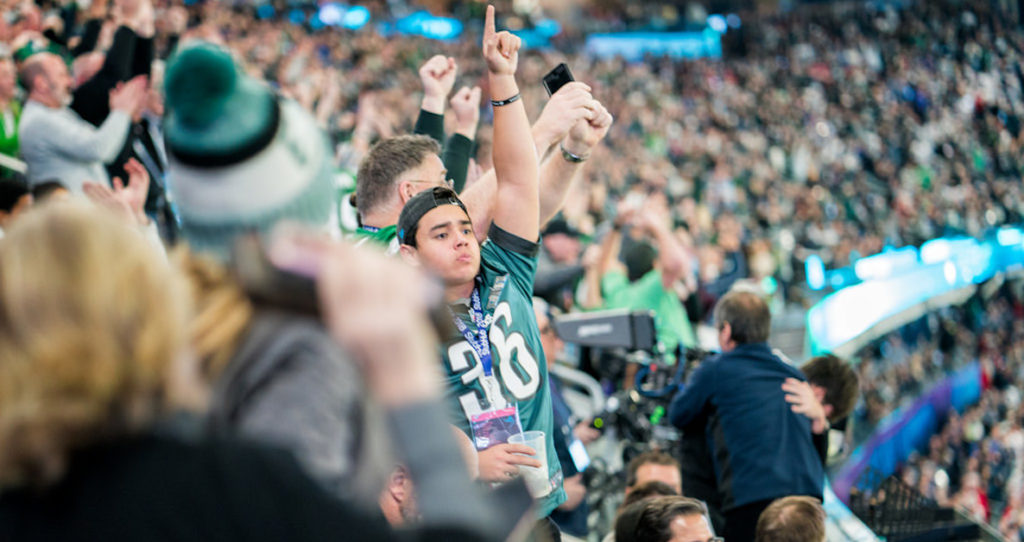Following in the tradition of Connor Barwin and Malcolm Jenkins, former All-Pro wide receiver and current Eagles broadcaster Mike Quick will write weekly for The Citizen this season, analyzing what the Birds will have to do each week on the field to emerge victorious. We’ve paired Quick with Professor Richardson Dilworth, Director of Drexel University’s Center for Public Policy, who will analyze how Philly stacks up off-the-field against the city we play each week. Dilworth, who knows nothing about football, is arguably Quick’s most unlikely teammate ever.
Mike Quick’s On-Field Scouting Report: Last Sunday, I opened our broadcast by saying that, for the Eagles to win, they’d have to bring their A+ game—not even their A game would be good enough, because New Orleans was just that good. Well, as we all know by now, the Eagles didn’t come close.
This week should be a much closer game, but these New York Giants are not the same team that the Eagles beat earlier this season. The biggest difference has been the improved play of their star rookie running back Saquon Barkley. He’s learned to stay with the play that’s called instead of just relying on his speed and bouncing every run outside. So the Giants’ power run game is working much better now, which gets to our first key: Stopping the Giants when they run the ball. The Eagles haven’t been stopping the run lately, due to breakdowns in gap security along the offensive line. When you don’t have the discipline to maintain gap security, that’s when big runs occur.
Also on the defensive side of the ball, the Eagles need to get back to causing turnovers. The Eagles defense hasn’t intercepted a pass since the last time they faced the Giants–and that was week 6 of the season. The team that wins the turnover game will likely be the team that wins this game.
Offensively, the Eagles have to get back to running the ball. In the Northeast, you need to run the ball in November and December to win. Rookie running back Josh Adams has been coming on, and he should get more carries this week.
The hope is that the Eagles will respond to the embarrassment of last week’s blow-out by coming out and getting off to a fast start. They’ve only scored three touchdowns in the first quarter all season. If they get off to a better start, they’ll feel better about themselves.
Prof. Richardson Dilworth’s Off-Field Scouting Report: New York City beat Philadelphia civically this season, but it has basically beat us every season since some time in the 1840s, when it eclipsed our city as the financial capital of the country. And in terms of urban growth it’s made some great decisions. There was, first of all, the Erie Canal. Really smart. Second, there was the consolidation. I have talked a lot about consolidation and regionalism this season—look at Nashville and Indianapolis, for example—and Philadelphia was also of course a relatively early example of city-county consolidation. But its borders have not expanded since 1854.
Only New York City went beyond a simply city-county consolidation when in 1898 it created a five-county city. This was absurdly ambitious, and part of the goal was that Republicans in Albany thought they could expand the city vote and hurt Tammany Hall. That failed, but in the process they created a geographically humongous city. And not soon thereafter the pieces started to come into place that would ultimately result in the massive subway system, which with its comprehensive coverage and single fare helped to facilitate density.
In short, New York has some natural advantages over Philadelphia, such as its port, but it has also been defined by the kinds of ambitious megaprojects that have kept it ahead of every other city in the country. And this tradition continues with the ultra ambitious “dryline” project (formerly the “Big U”) that is meant as a response to increasing storm surges and sea level rise as a result of climate change. The only proposed project that even remotely compares in Philadelphia is the idea of covering I-95 but even that seems pretty uninspired compared to the Dryline.
One way not reflected in the scores on which Philadelphia quite obviously beats NYC: Affordability. The absurd unaffordability of NYC is reflected in the fact that its median household income was only about $15,000 more than in PHL (2012-2016), but the median value of owner-occupied housing units IN NYC is more than $350,000 than in PHL.
So, we have that, anyway.

